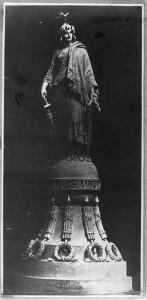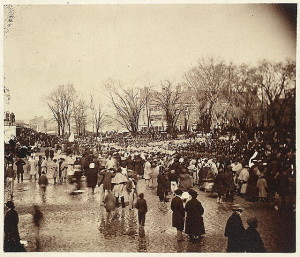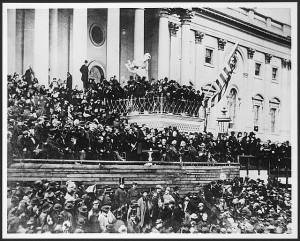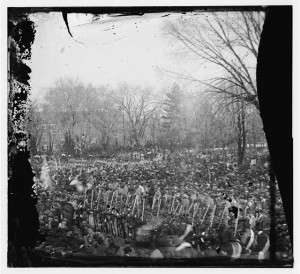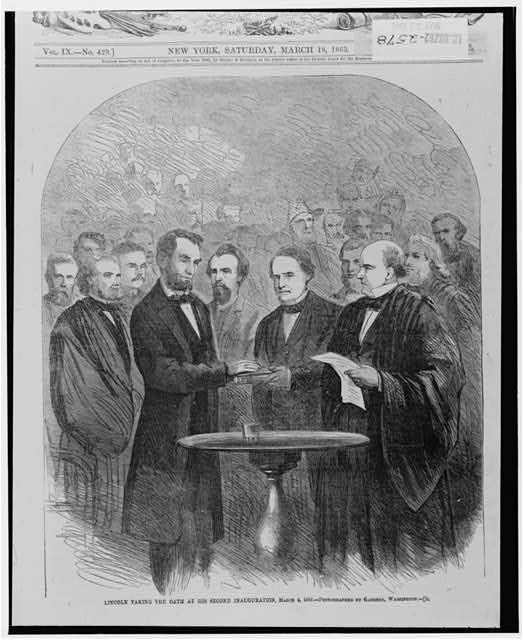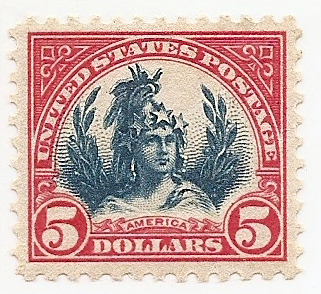Inauguration Day broke cold and rainy. High on the dome of the capitol, unfinished on this occasion four years ago, Thomas Crawford’s posthumous bronze Freedom, a sword in one hand, a victory wreath in the other, peered out through the mist on a scene of much confusion, caused in part by deepening mud that hampered the movement of the throng of visitors jammed into town for the show, and in part by Mrs Lincoln, who, growing impatient at a long wait under the White House portico, ordered her carriage to proceed up Pennsylvania Avenue at a gallop, disrupting the schedule worked out by the marshals. Her husband had already gone ahead to a room in the Senate wing, and was occupied with signing another sheaf of bills rammed through to beat the deadline now at hand. The rain let up before midmorning, though the sun did not break through the scud of clouds, and around 11 o’clock a small, sharp-pointed, blue-white diamond of a star – later identified as the planet Venus – appeared at the zenith, directly over the Capitol dome, bright in the myrky daylight sky.[1]
From the Richmond Daily Dispatch March 8, 1865:
Latest from the North.
We have received copies of Northern papers of the evening of Saturday, the 4th instant. Gold, 199 1-2.
Lincoln’s inauguration — his inaugural address.
The inauguration of Abraham Lincoln, for a second term, took place in Washington city on Saturday last. The following telegrams from Washington are the only accounts we find of the ceremony:
Washington,March 4.–The procession to escort the President to the capitol is now forming, though a heavy rain is falling and the streets are almost impassable with mud.
The avenue is one dense body of people. The inaugural ceremonies will take place in the Senate Chamber.
Washington,March 4–12.30. –The rain has ceased and the procession is now passing down the avenue. The display is exceeding grand. The sidewalks are jammed with people, and every window and house-top is occupied with ladies and gentlemen, who are waving their handkerchiefs and hats with great enthusiasm. The visiting PhiladelphiaFire Department and those of Washington attract great attention by their beautifully-adorned apparatus. Many bands of music are interspersed throughout the procession, and the entire line is one continuous ring of music.
The Chronicle representation have a large truck, with a printing press printing an extra Chronicle, which are scattered among the dense mass of humanity.
The procession is over an hour passing any given point.
The Navy-Yard delegation has a monitor in line, with a turret turning.
The immense amount of mud in the streets interferes with the magnificence of the display, yet it is, nevertheless, exceedingly fine.
A marked feature in the turn-out is the colored troops and Odd Fellows, with their bands of music.
The following is a copy of Lincoln’s inaugural address:
Fellow-Countrymen,–At this second appearing to take the oath of the Presidential office, there is less occasion for an extended address than there was at the first. Then, a statement, somewhat in detail, of a course to be pursued seemed fitting and proper. Now, at the expiration of four years, during which public declarations have been constantly called forth in every point and phase of the great contest which still absorbs the attention and engrosses the energies of the nation, little that is new could be presented.
The progress of our arms, upon which all else chiefly depends, is as well known to the public as to myself, and it is, I trust, reasonably satisfactory and encouraging to all.
With high hope for the future, no prediction in regard to it is ventured. On the occasion corresponding to this four years ago, all thoughts were anxiously directed to an impending civil war. All dreaded it — all sought to avoid it. While the inaugural address was being delivered from this place, devoted altogether to saving the Union without war, insurgent agents were in the city seeking to destroy it, without war — seeking to dissolve the Union and divide the effects by negotiation.
Both parties deprecated war. But one of them would make war rather than let the nation survive, and the other would accept war rather than let it perish, and the war came. One-eighth of the whole population were colored slaves, not distributed generally over the Union, but localized in the southern part of it,– These slaves constituted a peculiar and powerful interest. All know that this interest was, somehow, the cause of the war.
To strengthen, perpetuate and extend this interest was the object for which the insurgents would rend the Union, even by war — while the Government claimed no right to do more than to restrict the territorial enlargement of it.–Neither party expected by the war the magnitude or the duration which it has already attained. Neither anticipated that the cause of the conflict might cease with or even before the conflict itself should cease. Each looked for an easier triumph and a result less fundamental and astounding.
Both read the same bible and pray to the same God, and each invokes His aid against the other. It may seem strange that any man should dare to ask a just God’s assistance in wringing their bread from the sweat of other men’s faces; but let us judge not, that we be not judged. The prayer of both could not be answered — that of neither has been answered fully.
The Almighty has his own purposes. “Woe unto the world because of offences, for it must needs be that offences come; but woe to that man by whom the offence cometh.”
If we should suppose that American slavery is one of those offences which, in the providence of God, must needs come, but which, having continued through his appointed time, He now wills to remove, and that He gives to both North and South this terrible war as the woe due to those by whom the offence came, shall we discern therein any departure from those Divine attributes which the believer in a living God always ascribes to him?
Fondly do we hope — fervently do we pray — that this mighty scourge of war may speedily pass away; yet, if God wills that it continue until all the wealth piled by the bondsman’s two hundred and fifty years of unrequited toil shall be sunk, and until every drop of blood drawn with the lash shall be paid by another drawn with the sword, as was said three hundred years ago, so still it must be said “the judgments of the Lord are true and righteous altogether; with malice towards none; with charity for all.” With firmness in the right — as God gives us to see the right — let us strive on to finish the work we are in, to bind up the nation’s wounds, to care for him who shall have come the battle, and for his widow, and his orphan — to do all which may achieve and cherish a just and lasting peace among ourselves and with all nations.
- [1]Foote, Shelby. The Civil War, A Narrative. Vol. 3. Red River to Appomattox. New York: Random House, 1986. Print. page 810.↩

